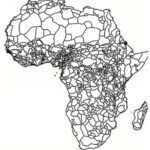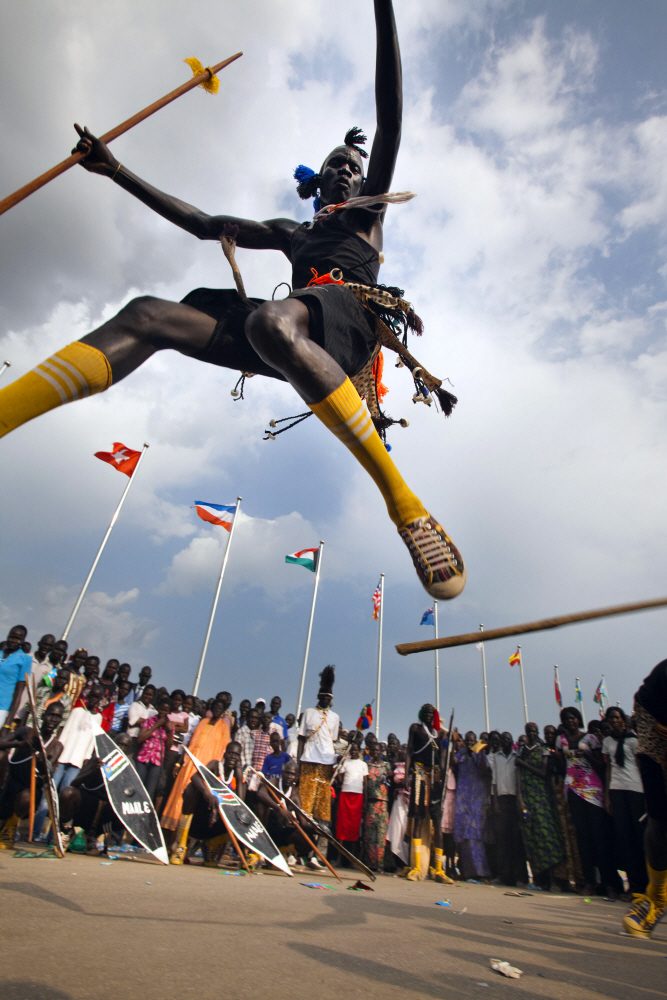One year after independence morale is still high in South Sudan. But the initial hope for a rapid start towards development, establishment of human rights and economic prosperity has faded. “It is as if the war never stopped,” sights the catechist John Deng in Bentiu. Bentiu lies in the centre of the South Sudan’s oil industry, but the town still looks like a dirty hamlet, with hardly any sign of visible progress. John has to look for fuel on the black market, a jerry can of 20 litres cost 280 South Sudanese pound when I was there in June 2012. Basic foodstuffs are, if available, very expensive because of the border closure with Sudan. “There is a shortage of everything, like during the war,” he laments.
“The Sudanese government closed the border and is hoping South Sudan will collapse,” says Governor Taban Deng in his office in Bentiu. Besides him sits generaal James Gatduel Gatluak, who directs the troops along the frontline with the disputed territory of Heglig. “You can never trust an Arab,” he sighs. Like during the war, the ruling Sudanese Peoples Liberation Movement (SPLM) is still in guerrilla mode.
Corruption
President Salva Kirr wrote a letter recently to 75 ministers and officials about the endemic corruption. He ended it with these words: “We fought for freedom, justice, and equality. Many of our friends died to achieve these objectives. Yet, once we got to power, we forgot what we fought for and began to enrich ourselves at the expense of our people.” In the letter he orders them to return the stolen funds (full or partial) in return for amnesty. The South Sudanese government opened an account in Kenya for this purpose.
During the days of the bush war, accountability was a very weak point among the Sudanese People’s Liberation Army. South Sudan is now paying the price for it. “It all has to do with our lack of structures during the liberation war. We were not prepared for ruling a country, we lack capacity and vision,” says Minister of Higher Education, Peter Adwok Nyaba.
Not very much has improved for the majority of the population since the SPLA took over power after the peace deal of 2005. According to Kiirs letter a staggering “Four billion dollars are unaccounted for, simply put, stolen by current and former officials, as well as corrupt individuals with close ties to government officials.” Four billion dollar is twice the annual government budget.
I asked every official I interviewed during my two weeks stay there recently, if he or she had received Kiir’s letter. Only one minister had. Corruption has been rather clumsy in South Sudan. It was not done by intelligently skimming of some money of a large budget; it was done by directly putting the hand in the cookie jar. Because of this lack of sophistication, the Americans have known for a long time which officials have been corrupt. A list with names was handed to the president by American officials more than a year ago. Names of suspected thieves circulate widely on the Internet.
Honeymoon
“The honeymoon is over,” says Pauline, who works at the ministry charged with setting up the civil service in the rural areas. “Everybody was used to stealing and nobody worked properly. SPLA soldiers turned civil servants think the government has a debt to settle with them, they don’t behave as servants of the people. We need a better work ethos. Now with the austerity, we will be forced to change. It’s a blessing in disguise.”
The blessing she refers to is the shutting down of all oil production in February. Despite being dependent on oil for 98 percent of its income, the government in Juba turned off the taps. Juba and Khartoum have not been able to find an amicable solution to the problem of transit costs for South Sudan’s oil to Port Sudan. At independence South Sudan gained control of 75 percent of the crude, but the oil facilities ( the pipeline to the harbour and refineries) are nearly all located in Sudan. Khartoum charged prices for these services that were too high in the opinion of Juba.
Harder days lie ahead. The government still operates in guerrilla mood and it is convinced it can survive with the remaining little income until the end of the year. South Sudan hardly produces anything and is therefore reliant on imports of every conceivable product, from soap to trucks and fresh fruits. There is a belief among the political leaders that foreign donors will take care of the countries basic needs, as they did during the years of the civil war. “There is hardly a formal economy, so there is not very much to collapse,” says a private banker in Juba.
It has not been a happy first year of independence. A near-war situation exists with Sudan about disputed borders and the benefits flowing from South Sudan’s oil. Intertribal fighting in Jonglei State has killed thousands and only recently, after a successful disarmament operation, the tensions have eased.
On top of this all, civilians don’t feel save about their own rulers either. According to a human rights report issued by the American government, SPLA soldiers still widely beat and detain people without charge. Journalists complain about their freedom.
Some among the new rulers are aware. “We are just muddling through,” admits a minister.
Also read: Crocodile Tears, and Return to Uncertainty

